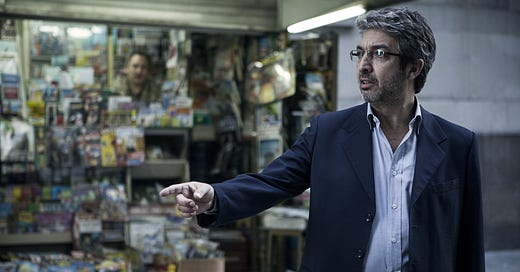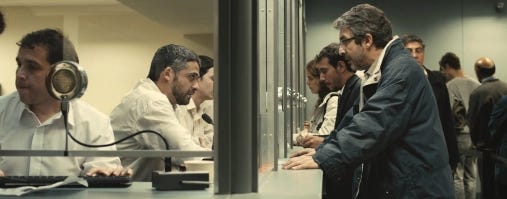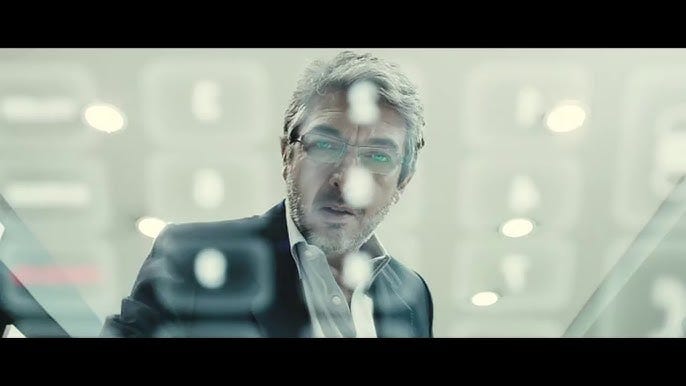Bombita, the fourth of six short films, tells the story of a demolition expert (Ricardo Darín) who discovers that his car has been towed whilst picking up his daughter’s birthday cake. As he grudgingly pays the towing fee after arguing his case, he misses his daughter’s birthday party. The next day, he attacks the DMV for not refunding his fee, which causes his wife to seek divorce and sole custody of their child because he got arrested. Just as you think his week couldn’t get worse, he unsuccessfully applies for another job and his car gets towed again! Out of pure frustration of modern society, he plants explosives in his car and parks it in a tow zone. When it gets towed again, he detonates the explosives and becomes a local hero in prison for standing up against society, which earns him the nickname “Bombita” (“Little Bomb”).
The Narrative:
The film begins with a beautiful shot of the main character’s blue light shining through a hole, which establishes that he is at work. Lights begin to flicker as suspenseful music plays and we see the protagonist slowly walk closer to the camera, which was inspiring because it was very eye-catching. As the film progresses, we learn that it is set in a large city and that the main character, Simón, is a demolition expert and a father that has a problem with how society is ran. The story follows Simón during a terrible week where everything and everyone is against him, and it all builds up to the moment he explodes and gets his revenge by blowing up the DMV. I like how the pace of the film is quite slow and very subtly foreshadows the ending, for example, with the shot at the beginning where a building is demolished, because it makes the ending very surprising and unexpected.
Cinematic Influences:
Bombita perfectly represents Argentinian society because 2014 was a time where individuals took a stand against the social corruption and the county’s economic downfall, which is seen repetitively (in order to make a lasting impression on the audience) through the character of Simón and how he stands up to society. Argentina’s film business gained a lot of investment at that time, which is seen through this film’s high budget, as there are multiple explosives throughout the short film. I believe that this film’s genre is drama because tension rises frequently throughout the film, for example when his wife announced that she wanted a divorce. The cinematography in Bombita is very memorable because I noticed that it’s dominating colour is blue, as it is seen in: Simón’s car, his clothes, the light at the very beginning of the film, and overall seen within lots of locations and props that reoccur throughout the film. The sound of Bombita is very captivating because you can hear the city traffic which establishes the film’s setting. The blunt music on the radio represents Simón’s frustration, and the glass that separates the public to the DMV’s employees distorts the sound, which reflects the corrupt relationship between working classes and high officials in Argentina at that time. I also like how the positive, up-beat music contrasts the scene just before the explosion in the car is activated because it provides comedic relief. The film’s editing was used effectively because I liked the sequence near the end where the newspaper reports about the attack are overlayed onto shots of the city and fade into each other. The mise-en-scène is used to show that the film is set in a busy, crowded city, which represents and establishes the capitalism of Argentinian society. Finally, the performances were amazing, especially the lead actor who played Simón, Ricardo Darín, because he perfectly portrayed his character’s frustration with society and managed to capture his emotions throughout the story and the change in his character’s arc as he became increasingly angry.
Creating Meaning and Effect:
The main group being represented in Bombita is the public and captialism’s effect on them. This is used to criticise Argentina’s society and how everything is centred around money, and the film’s message was to say that more people need to be like Simón and take a stand against something when they think that it is wrong. This is shown when a lady tells Simón that they’re “all in the same boat,” as everyone is affected by society’s greed. The film’s aesthetic is quite fast paced and overwhelming, which is achieved through the mise-en-scène and sound that establish that the film is set in a busy city. I feel like this contrasts with the cold atmosphere of the film, which is achieved through the dominating blue colour throughout the film, which is used to show Simón’s sadness caused by the events that occur.
In conclusion, I really enjoyed Bombita because it was very intriguing to see what Simón’s anger would build up to. I also loved the ending because, although he was in prison, it was a very happy ending because his wife and child spent his birthday with him, whilst he was celebrated by the other prisoners for being a local hero who stood up for what he believed in. I felt at times that the pace was quite slow and it was becoming boring, but this was resolved with the unexpected ending.
⭐️⭐️⭐️⭐️





